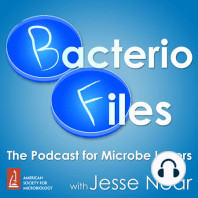12 min listen
487: Probiotic Pulverizes Pathogen Persisters
FromBacterioFiles
ratings:
Length:
12 minutes
Released:
Nov 20, 2023
Format:
Podcast episode
Description
This episode: A probiotic strain of E. coli can target and destroy pathogens that survive a treatment of antibiotics! Download Episode (8.2 MB, 12 minutes) Show notes: Microbe of the episode: Streptomyces griseoruber Takeaways Antibiotic resistance is becoming more and more of a problem as bacterial pathogens develop resistance to more and more drugs. For some people who develop an infection that is resistant to everything, it's as if they were living back in the days before antibiotics were discovered, when all they could do was pray for survival. New antibiotics are needed, but even more needed are new ways of approaching treatment of infections, using innovative approaches and combinations of therapeutics. In this study, a probiotic strain of Escherichia coli was used to target potentially pathogenic E. coli bacteria that can survive treatment with a particularly effective type of antibiotic, fluoroquinolones. This probiotic strain, called Nissle, delivers toxins directly to the survivors, preventing resistant pathogens from proliferating. Journal Paper: Hare PJ, Englander HE, Mok WWK. 2022. Probiotic Escherichia coli Nissle 1917 inhibits bacterial persisters that survive fluoroquinolone treatment. J Appl Microbiol 132:4020–4032. Email questions or comments to bacteriofiles at gmail dot com. Thanks for listening! Subscribe: Apple Podcasts, Google Podcasts, Android, or RSS. Support the show at Patreon, or check out the show at Twitter or Facebook.
Released:
Nov 20, 2023
Format:
Podcast episode
Titles in the series (97)
401: Phototrophs Fill Fungal Filaments: This episode: In this partnership between fungus and algae, the algae eventually take up residence inside their partner! (8.4 MB, 12.1 minutes) Show notes: Microbe of the episode: / Takeaways Partnerships and cooperation between otherwise... by BacterioFiles
